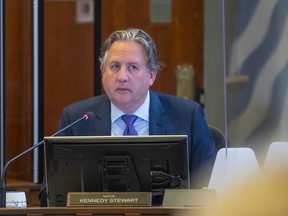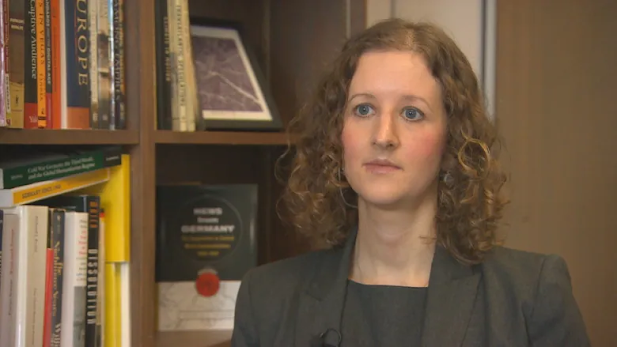CSIS officials briefed Vancouver mayor on foreign election interference
The news comes at a time when alarms are being raised about foreign election interference at the federal level. But an expert says municipal elections could also be vulnerable.

Article content
Officials from Canada’s national intelligence agency requested a meeting last month with Vancouver Mayor Kennedy Stewart to brief him on the risks of foreign interference ahead of this fall’s municipal election.
Article content
The Canadian Security Intelligence Service (CSIS) met with Stewart in late May, the mayor’s calendar shows.
Reached on Friday, Stewart confirmed that the meeting happened at CSIS’ request. He said he and his co-chief of staff Neil Monckton met with “a very senior CSIS official and a subject expert on China.”
“They briefed me for almost two hours on foreign interference in domestic politics,” Stewart said. “When I queried further as to specific reasons, they said they couldn’t tell me, which raised concerns.”
Stewart said that, as per their usual practice, the CSIS officials did not confirm or deny the existence of any specific evidence in relation to the municipal election this October.
“They did say, however, that this type of briefing is highly unusual,” Stewart said, and they provided a general briefing on risks, past examples elsewhere, and what to look for.
Article content
Stewart said he did not know whether any other local politicians had received similar briefings from CSIS, and Postmedia contacted other Metro Vancouver mayors to ask. A City of Surrey representative said CSIS had not requested to meet with city staff or the mayor, and New Westminster Mayor Jonathan Cote said he had not been invited to any such meetings.
Asked about the meeting with Stewart, CSIS spokesman Brandon Champagne said: “As you can expect, I cannot discuss the specifics of our interactions with organizations or individuals.”
Champagne added that CSIS routinely engages with a range of people, including elected officials, “to discuss the potential threats to the security and interests of Canada, and provide briefings regarding specific threats.”
Article content
“CSIS delivers these briefings in order to promote awareness of foreign interference and the actions of other hostile actors to strengthen individual security practices and protect Canadians and their interests,” Champagne said.
Elections B.C., which oversees campaign financing and advertising for municipal elections, has not, to date, “observed significant instances of disinformation or foreign interference in local or provincial elections in B.C.,” said spokesman Andrew Watson. But he added: “As has been well-documented, the risks posed to electoral democracy by disinformation and foreign interference are real, and it is possible that they will be present to a greater degree in future B.C. elections, at all levels.”
Article content
While B.C. has restrictions on foreign funding of campaigns, including bans on contributions from corporations and non-residents of B.C., the province’s election legislation does not regulate the content of election advertising, Watson said. “This means Elections B.C. does not regulate whether or not an election communication constitutes ‘disinformation’.”
B.C.’s election laws do have transparency measures, requiring election advertisers to register with Elections B.C. so the public knows who is paying for advertising or conducting other paid canvassing activities designed to influence voting, Watson said.
But Elections B.C. has called for the province’s electoral legislation to be “strengthened to better mitigate disinformation and foreign interference threats,” Watson said.
Article content
In 2020, B.C.’s chief electoral officer Anton Boegman submitted a report to the legislative assembly recommending changes, “to ensure British Columbia’s electoral process stays fair and transparent in the era of digital campaigning.”
The report’s recommendations, which apply to both B.C.’s local and provincial elections, asked legislators to consider restrictions on deliberate disinformation campaigns intended to interfere with the electoral process, similar to provisions at the federal level in the Canada Elections Act. The report also noted that currently, “foreign and out-of-province entities may be able to indirectly or anonymously provide funding to registered third-party advertising sponsors,” and recommended prohibiting advertising platforms from accepting election advertising from foreign entities.
Article content
At the time of the May 2020 report, Boegman said the government faced more urgent priorities while grappling with the COVID pandemic. “But I encourage legislators to take proactive steps to safeguard our electoral process before the province’s next provincial election” (which was later held in October 2021).
But as of June 2022, the province has made no legislative changes based on the report, Watson said. “We are hopeful that legislators will adopt our recommendations before the next provincial general election in B.C., scheduled for 2024.”
In an emailed statement, B.C.’s ministry of the attorney-general said: “Policy analysis on the recommendations is ongoing and government will be acting on some of the recommendations once analysis is completed.”
Article content
The news about Stewart’s CSIS briefing comes as alarms are being raised about these issues at the federal level. On Wednesday, Commissioner of Canada Elections Yves Côté told CBC News that foreign interference and disinformation pose “a particularly significant challenge” for Canada’s electoral system.
Côté told CBC he has negotiated agreements with tech companies such as Twitter, Google and Facebook that make it easier for his office to investigate complaints, but he does not have agreements with other “foreign agencies” like Tencent, the company that owns the popular Chinese-language online messaging platform WeChat.
Earlier this week, The Canadian Press broke the story that before Canada’s last national election, a federal research unit detected what might have been a Chinese Communist Party information operation to discourage Canadians of Chinese heritage from voting for the Conservatives. Asked to comment on the report, the Chinese Embassy in Ottawa told The Canadian Press: “China has always adhered to the principle of non-interference in the internal affairs of other countries.”
Foreign interference could be a problem for any level of elections, including municipal, said Heidi Tworek, an associate professor in international history and public policy at the University of B.C. “One of the major issues is that we focus on federal elections and have little research on municipal and provincial elections.”
Ahmed Al-Rawi, an assistant professor at Simon Fraser University, said: “We don’t have in Canada the necessary infrastructures to closely monitor and promptly report to the general public on such interference.”
This is especially true when it happens in languages other than English, or on alternative social media sites such as Parler, Rumble or BitChute, said Al-Rawi, who is also director of The Disinformation Project, a federally funded research project examining fake news, misinformation and disinformation.
Article content
“I think the public needs to be better and more promptly informed if there are cyber operations trying to influence them. We don’t have such mechanisms in place,” Al-Rawi said. “The government should get more data from social media companies and search engines like Google, and this data needs to be shared with researchers. Again, this is unfortunately not happening.”




No comments:
Post a Comment
Comments always welcome!